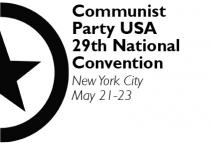 This article is part of the discussion leading up to the Communist Party USA’s 29th National Convention May 21-23, 2010. CPUSA.org takes no responsibility for the opinions expressed in this article or other articles in the pre-convention discussion. All contributions must meet the guidelines for discussion. To read other contributions to this discussion, visit the site of the Pre-Convention Discussion period.
This article is part of the discussion leading up to the Communist Party USA’s 29th National Convention May 21-23, 2010. CPUSA.org takes no responsibility for the opinions expressed in this article or other articles in the pre-convention discussion. All contributions must meet the guidelines for discussion. To read other contributions to this discussion, visit the site of the Pre-Convention Discussion period.
All contributions to the discussion should be sent to discussion2010@cpusa.org for selection not to the individual venues.For more information on the convention or the pre-convention discussion period, you can email convention2010@cpusa.org.
There are many things that are very positive and true in the analysis of both the preconvention committee and Sam, such as the concept of three stages of political development in our drive towards socialism. The challenge to our party to become more deeply involved in mass struggles is absolutely correct. The concept of a popular movement with the working class and the nationally oppressed peoples at the center of such a movement is basic. Further, the comment about the possibilities of a backward movement in the struggle for reforms is also very important.
However, not enough attention so far has been paid to the growing massive discontent with the reform efforts of the Obama administration. If we are Marxists, one of our tasks should be to seek to explain certain contradictions in real life between what appears to be reform and what is not. In making this effort, we will be making a contribution to the millions of people seeking to get answers as to why things are so disappointing. As Dimitrov and others have pointed out, during times of economic crisis where millions of people are out of work, it is not a given that all of these masses will automatically turn towards progress and socialism. In fact, the real problem is that some will move in a progressive direction and many others will move in a reactionary direction. In this they will be lured by demagogic promises by the ultra-right. Thus, we see today the phenomenon of the Teabaggers, where many people who attend these rallies, when queried, express contradictory views about the political scene. As noted, on the one hand they oppose the big government, but on the other hand they like their Medicare and Social Security.
We can’t walk away from a deeper analysis of these reactionary trends. To do so will ultimately cause us many problems. The masses of people both in the progressive movement and in the conservative movement are perplexed by the contradictions of the Obama administration. They are further frustrated by the insufficient efforts to solve the unemployment crisis and the housing crisis. The shortcomings of the proposed health care bill is another item of deep frustration, even though many negative features of this legislation have been brought on by the efforts and maneuverings of the Republicans in Congress.
We can’t walk away from or cover up the fact that Obama ran on a program and slogan of “Change We Can Believe In” and yet the outcome has been quite different from what people expected. The slogan had different meanings for different sections of the population. For workers, it meant real health care reform, more job security, and the right to organize. For others it meant tax relief and assistance to small entrepreneurs in developing their businesses. For women, it meant a struggle to preserve the right for them to control their own bodies, and for the peace movement, it meant an end to the war in Iraq.
Since the end of the campaign, the results have been quite different. For one thing, Obama’s insistence on developing a so-called just war in Afghanistan is now coming to fruition, with human losses both in the United States and abroad. On the health care front, despite the fact that Obama has expressed publicly his support for the idea of single payer, in practice he has stated that single payer is off the table. When we consider the various compromises made in the effort to get the health care bill out of Congress, it gives pause to the question, why did the president not take a stronger position to shape the process?
Further, despite small efforts at preserving jobs in the auto industry, many people are frustrated and angry at the stimulus packages. They see millions of dollars being given to banks and corporations without these corporations using the funds to help the people. Instead, they quietly pocket the money to enrich their own stockholders. The straw that breaks the camel’s back is the reported excesses of CEO golden parachute packages at a time when masses of people are facing cuts in social services, loss of their homes and unemployment. These contradictions become the fuel for the right wing to make propaganda to undo the Obama reform efforts.
To simply gloss over these defects, despite the fact that the PW has consistently reported on these defects, does not help things, either in our contribution to the mass struggle or in the development of an understanding of where we’re going. Even though we are in full support of every effort by the Obama administration for relief of the people’s problems, it is still important in a Marxist sense to analyze the contradictions between what is proposed and the results. In doing so we will undercut the “great man” theory of Obama doing all things by himself. It is important that people not rely too much on what is proposed or to expect greater positive results. Obama, despite his progressive projections, is still a representative of one section of the capitalist class. He seems to represent that group that feels compelled to seek a better solution to the United States’ economic and social problems than the previous administration. The fact of the enormous deficit and the outstanding debt to countries such as China plays a major part in the development of Obama’s foreign and domestic policies. If we can begin to grasp the fact that as far as Obama is concerned, ” the spirit is willing but the flesh is weak,” if we can begin to grasp the fact that despite his progressive background and despite a number of positive moves that he has so far made such as the nomination of Sotomayor to the Supreme Court, he is still a representative of a section of the ruling class, we can then begin to plan strategy and tactics that will enable the administration to move forward in a progressive direction and to reduce its effort to go in an opposite direction.


 Join Now
Join Now